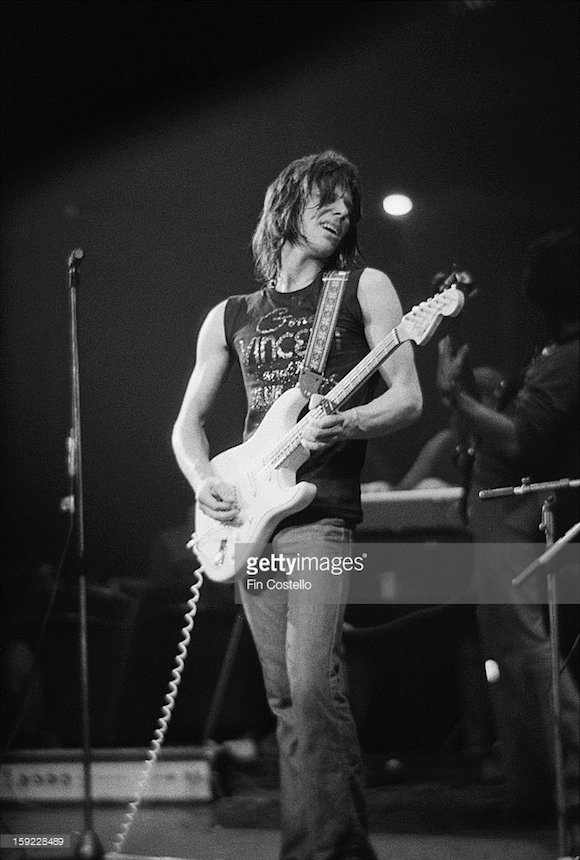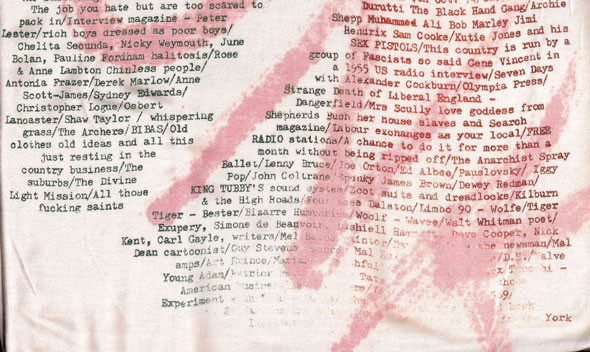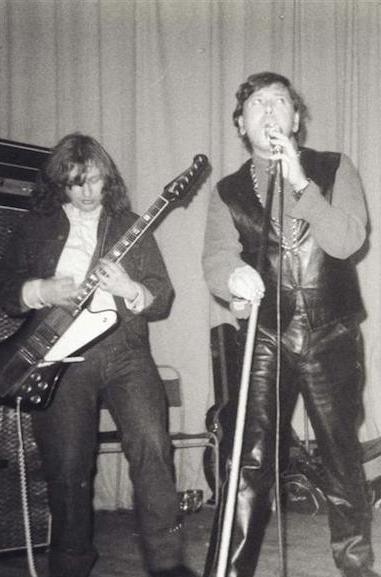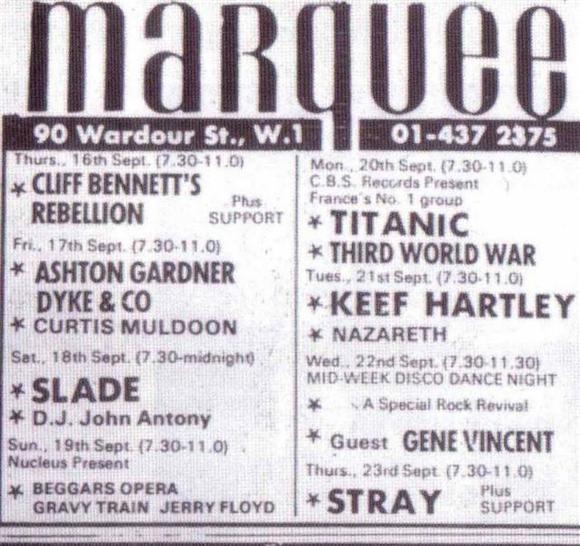‘This country is run by a group of Fascists’: When Malcolm McLaren met Sweet Gene Vincent backstage at The Marquee
//Clockwise from top left: Gene Vincent with one of The Houseshakers, Magnet Club, Chelmsford, UK, February 1971. Photo: http://gene.vincent.fanclub.voila.net; Let It Rock assistant in Gene Vincent and the Blue Caps top, Wembley Stadium, August 5, 1972. Photo: Masayoshi Sukita; Vincent’s quote as featured on the Sex t-shirt You’re Gonna Wake Up, 1974//
‘Gene Vincent for me was the embodiment of rock’n’roll’
Malcolm McLaren 1997
On September 22 1971, Gene Vincent was a mid-week booking to play a “rock revival” night at central London club The Marquee.
Times were tough; at just 36, the soft-spoken American rocker was apparently way past his heyday and beset by severe health problems brought on by the combination of alcoholism and addiction to prescription drugs taken to dull the constant pain in his left leg. This was the result of a crippling motorbike accident in his youth and the lingering effects of having been in the 1960 car-crash which killed Eddie Cochran.
Vincent’s partner Marcia Avron had elected to stay home in their apartment in California’s Simi Valley. Unbeknown to him, she was stripping it of all of their belongings and was about to disappear without a word.
The week before, on arrival in the UK, Vincent had been served with High Court maintenance documents by lawyers representing his British ex-wife Margaret Griffith, with whom he had a daughter, Sherri-Ann. And his fourth wife Jackie Fusco had instituted divorce proceedings back in the US.
Vincent’s two most recent albums – now adjudged cult classics – had been flops and the tour would soon peter out after a handful of scrappy gigs.
Among the visitors to The Marquee that Wednesday night was the 25 year-old rock & roll fan Malcolm McLaren. In later life he recalled the evening as a turning point. At that stage, McLaren had become frustrated after having spent two years assembling footage for a psycho-geographic film history of Oxford Street as his diploma project at Goldsmith’s art school. To complete it, he settled on the off-the-wall device of using an original rock-and-roller as the documentary’s “roving reporter”.
McLaren had already pursued his British hero Billy Fury, whose road manager Hal Carter told him that the erstwhile Ronald Wycherley was by then more interested in ornithology than popular culture. Spying the listing for Vincent in the music press, McLaren gained access to the backstage area at The Marquee and was at first horrified by Vincent’s debilitated condition.

//Vincent fan and Let It Rock customer Jeff Beck onstage at The Roundhouse, Camden, London, July 1, 1972. Photo: Fin Costello/Rex//
“He was drunk on Martini, his eyes red and bulging and his face like a moon,” recalled McLaren in the mid 90s. “As we spoke a guy was pushing his face into a bowl of cold water in an attempt to sober him up. Vincent told me he was embittered by his whole experience as a singer and was full of rancour for America.”
Despite this, McLaren – who had been engaged in subversive political activities since 1968 – was impressed by the singer’s boldness. “He said he had voluntarily gone into a lunatic asylum after smashing the head of Capitol Records in the face when he stormed in to demand money.
“Immediately after the McCarthy period, Vincent told a reporter that America was run by a bunch of fascists, something which didn’t enter into the rock’n’roll vocabulary at the time. After all my political shenanigans here was a guy I thought would never know the meaning of politics making statements like that.
“I was staggered. Vincent for me was the embodiment of rock & roll. I had a genuine feeling of respect for the man yet at the same time felt remorse for the pitiful figure vomiting before me.”
The encounter was a deciding factor in McLaren giving up the idea of completing the Oxford Street film. Instead he was propelled towards his love of rock & roll and an instinctive understanding that its expression through fashion and music could be directed into making broad cultural statements.
Within a few months he and his friend and fellow ex-art student Patrick Casey had set up shop in the back of 430 King’s Road and when the business was transformed into Let It Rock and subsequently Sex with Vivienne Westwood, the debt owed to Sweet Gene Vincent was acknowledged, first in glitter t-shirts.
“This was my homage to him,” said McLaren. “I made sure we created one version in the same shade of blue as that of his famous Blue Caps.”

//Vincent is aligned with Kutie Jones & his Sex Pistols. From You’re Gonna Wake Up And Know Which Side Of The Bed You’ve Been Lying On!, first produced November 1974//
A couple of years later, McLaren inserted a reference to Vincent’s anti-American statement in the You’re Gonna Wake Up manifesto top compiled with its originator Bernie Rhodes and their friend Gerry Goldstein. While it is worth noting that Vincent’s incendiary words are juxtaposed with the first printed mention of the Sex Pistols’ name, the quote was dated on the shirt to 1955, before Vincent had risen to prominence (as rock & roll authority Brian Nevill has pointed out). In the 90s notes of his memories of the encounter, McLaren gave the year as 1958, which is more likely, though by the time of the meeting, Vincent was prone to making unsubstantiated statements.
Whatever, the rebellious spirit of the remark stirred McLaren, who said: “Gene Vincent never got to be my roving reporter. Three weeks after our meeting he was dead.”
As detailed in John Collis’ 2011 dual biography of Vincent and Eddie Cochran, the singer died from a perforated ulcer in the forecourt of his parent’s mobile home in Saugus, California, on October 12, 1971. His last words were: “Momma you can phone the ambulance now.”
This poignant documentary provides insights into Gene Vincent’s beleaguered position by the late 60s:
This is an extract from Vincent’s final interview, with BBC Radio One a week before his death:
Remember him this way. Sunshine, from the eponymous 1970 Kama Sutra album also known as If Only You Could See Me Today:
Thanks are due to the excellent Gene Vincent tribute site Lonely Street.
John Collis’ book Rock & Roll Revolutionaries is available here.
Joe Foster’s Rev-Ola compilation, which includes the Kama Sutra material, is available here.





